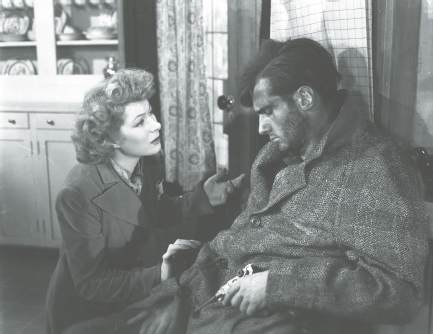William Wyler (70 page)
Authors: Gabriel Miller

Summerville, Slim
Sunderland, Nan
Surtees, Robert
Swerling, Jo
Swink, Robert
Sydney, George
Â
Tallichet, Margaret (“Talli”; WW's second wife)
Tannenbaum, Harold
Taylor, Elizabeth
Technicolor
Technorama
Ten Commandments, The
(DeMille)
Thalberg, Irving;
The Good Earth
That Certain Woman
(Goulding)
These Three
(WW); casting; composition/framing; courtroom scene; critical reception/success of; ending; graduation scene; Hellman's
Children's Hour
adapted for; house as setting for; indoor/outdoor scenes; isolation of heroines in; Joe's inadvertent stay in Martha's room; Joe's proposal to Karen; Lily's entrance; Martha and Karen's relationship; Martha and Karen's relationship with Joe; Mary's entrance; Mary's lies; music; opening shot; plot; political context for; “quality of mercy” speech in; remake of; social issues in; on society vs. nature; on society vs. the individual; staging of confrontation; staircase scenes; style; title; Toland's camera work on; WW's contract/salary for; WW's disappointment with
They Knew What They Wanted
(Howard)
This Is the Army
(Berlin)
Thomas, J. Parnell
Thomson, David
Thorpe, Franklyn
Three Godfathers
(film, 1948; John Ford)
Three Godfathers, The
(film, 1916; Le Saint)
Three Godfathers, The
(film, 1936; Boleslawski)
Three Godfathers, The
(novel; Kyne)
Thunderbolt
(WW and Sturges)
Till the End of Time
(Dmytryk)
Tiomkin, Dmitri
To Each His Own
(Leisen)
Toland, Gregg:
The Best Years of Our Lives
filmed by;
Come and Get It
filmed by;
Dead End
filmed by; deep-focus technique used by; early association with WW;
The Little Foxes
filmed by; reputation of;
These Three
filmed by;
The Westerner
filmed by;
Wuthering Heights
filmed by
Tom Brown of Culver
(WW)
“Tom Brown's School Days”
Townsend, Jimmy
Tracy, Spencer
Trevor, Claire
Truman, Harry S.
Trumbo, Dalton
Tunberg, Karl
Twelfth Air Force. See also
Thunderbolt
Twelve O'Clock High
(Bartlett and Lay)
Â
Unfinished Woman, An
(Hellman)
Union Pacific
(DeMille)
union's right to organize
United Artists
Universal Pictures. See also
Hell's Heroes
Uris, Leon
Â
Van Every, Dale
Variety
Venus Observed
(Fry)
Vertigo
(Hitchcock)
Vidal, Gore
Vidor, King:
Street Scene
Vietnam War
Vinegarroon
(Lake)
Virginia City
(Curtiz)
Vista-Vision
Von Sternberg, Josef.
See
Sternberg, Josef Von
Von Stroheim, Erich.
See
Stroheim, Erich Von
Â
Wagner housing bill
Wallace, Henry
Wallace, Lew:
Ben-Hur
Wallis, Hal
Wanger, Walter
war films. See also
Memphis Belle; Mrs. Miniver; Thunderbolt
Warner, Harry
Warner, Jack
Warner Brothers
Warrick, Ruth
Warshow, Robert
Washington Square
(James)
Watch on the Rhine
(Hellman)
Webb, James
Welles, Orson;
Citizen Kane
West, Claudine
West, Jessamyn;
The Friendly Persuasion
West, Mae:
The Drag
Westerner, The
(film; WW); action scenes; Bean challenged by Jane-Ellen; Bean's character; Bean's death; Bean's historical status vs. his portrayal; Bean's love for Lillie Langtry; Bean vs. the cattlemen; budget; casting; cattle herd in; Cole and Bean's friendship; Cole's character; Cole's love for Jane-Ellen; Cole's trial; comedy in; “Cooper Story” script revisions; ending; as historical romance; homesteader vs. cattleman plot; industrialization's role in; Jane-Ellen's character; Lake's
Vinegarroon
adapted for; music; nature and transformation of wilderness in; new vs. old order in; opening shots; opening title sequence; Oscars for; outdoor scenes; postproduction work; premiere; production schedule; publicity; release date; and rights to the Roy Bean story; “Saddle Tramp” script revisions; sepia printing for; shooting location; shooting schedule/difficulties; steer-killing farmer is hanged; themes; Toland's camera work on; WW's direction of
westerns
We the People
(Rice)
Wilcoxon, Henry
“Wild Boys of the Road, The” (Ahearn)
Wilder, Billy;
Ace in the Hole
;
Love in the Afternoon
Wilder, Robert
Wilder, Thornton
Willkie, Wendell
Wilson, Michael
Wimperis, Arthur
windows as metaphors for entrapment
Winged Victory
(Hart)
Wise, Robert:
The Sound of Music
Wiseman, Joseph
Wolfe, Thomas:
Look Homeward, Angel
Wood, Robin
Wordsworth, William: “A Night Piece”
Works Progress Administration
World War II: atomic bombs dropped on Japan; economic/political issues following; films about (see also
Memphis Belle; Mrs. Miniver; Thunderbolt);
Japan attacks Pearl Harbor; rise of totalitarian governments in; traumatized veterans of
World Wide Productions
Wright, Teresa
Wright, William
Writers' Guild of America
Wuthering Heights
(film; WW): casting; Cathy and Heathcliff's love; Cathy marries Edgar; Cathy's character; composition/framing; critical reception of; endings; experimentalism of; expressionism of; flashback scenes; Heathcliff returns from America; Heathcliff's death; house as setting for; Mr. Earnshaw's death; novel adapted for; opening shot; Oscar nominations for; Pennistone Crag scenes; society vs. nature in; society vs. the individual in; stylistic/thematic importance of; symbolic artistry of; Toland's camera work on
Wuthering Heights
(novel; Brontë)
Wyler, Melanie (WW's mother)
Wyler, Robert (WW's brother)
The Big Country
, involvement in; death of;
Detective Story
, involvement in;
Friendly Persuasion
, involvement in;
The Heiress
, involvement in;
A House Divided
, involvement in;
Roman Holiday
, involvement in;
The Shakedown
, involvement in
Wyler, William: Academy Awards and; affair with Bette Davis; anticommunism of; in the Army Air Force; arrival in America/background of; autocratic behavior of; Bazin on; bombing missions by; career, overview of; CFA role of; on composition; death/funeral of; vs. DeMille; on the director's function; vs. John Ford; at Goldwyn Productions; Goldwyn's relationship with (
see under
Goldwyn, Samuel); hearing loss by; HUAC investigation of; HUAC's impact on; illness of; investigation of communist affiliations of; Israel supported by; Leenhardt on; liberalism of; Liberty Films cofounded by (
see also
Liberty Films); marriage to Sullavan; marriage to Talli; military commission for; on morality; on Nazism; as non-pacifist; optimism of; Peck's friendship with; perfectionism of; politics/activism of; preliminary work on
The Sound of Music
; Production Code challenged by; on propaganda films; religious views of; reputation of; retirement of; Sarris on; at Universal; on the war; World War II involvement of; World War I's impact on
â
AWARDS
: American Film institute's Life Achievement Award; Directors' Guild Award; Golden Palme; Griffith Award; New York Film Critics Awards; Oscars; Thalberg Award; Victoire Award
â
FILMS
: authority/style of; breadth of;
The Children's Hour
;
Crook Buster
; deep-focus technique in; diversity of; early style of;
Ferry Command
;
The First Americans
;
The Gay Deception
;
The Good Fairy
;
Her First Mate
;
A House Divided
; houses used in;
How Green Was My Valley
(collaboration);
How to Steal a Million
;
Lazy Lightning
; melodrama in;
Memphis Belle
;
The Negro Soldier
;
Nine Lives
; overview of; pessimism in;
Phyllis Was a Fortress
; postwar;
R.A.F.-A.A.F
.; realism of; retakes in; retrospective of; script revisions by WW;
The Shakedown
; social/political vision in; staircases used in;
Thunderbolt
;
Tom Brown of Culver
; triangular shots in; war documentaries (see also
Memphis Belle
); window-framed shots used in.
See also specific films
â
WRITINGS
: “Escape to Reality”; “Flying over Germany”; “Forgotten Boy”;
Laughing Boy
; “No Magic Wand”; “Steel”
Â
Yordan, Philip
Yoshimura, Kamisaburo
Young, William W.:
Ben-Hur
Yvain, Maurice
Â
Zanuck, Darryl F.;
The Longest Day
produced by; military commission for
Zerbe, Anthony
Ziegfeld Follies
Zimbalist, Sam
Zinnemann, Fred;
High Noon
;
The Search
Zukor, Adolph
S
CREEN
C
LASSICS
Screen Classics is a series of critical biographies, film histories, and analytical studies focusing on neglected filmmakers and important screen artists and subjects, from the era of silent cinema to the golden age of Hollywood to the international generation of today. Books in the Screen Classics series are intended for scholars and general readers alike. The contributing authors are established figures in their respective fields. This series also serves the purpose of advancing scholarship on film personalities and themes with ties to Kentucky.
ERIES
E
DITOR
Patrick McGilligan
OOKS IN THE
S
ERIES
Mae Murray: The Girl with the Bee-Stung Lips
Michael G. Ankerich
Hedy Lamarr: The Most Beautiful Woman in Film
Ruth Barton
Von Sternberg
John Baxter
The Marxist and the Movies:
A
Biography of Paul Jarrico
Larry Ceplair
Warren Oates:
A
Wild Life
Susan Compo
Jack Nicholson: The Early Years
Robert Crane and Christopher Fryer
Being Hal Ashby: Life of a Hollywood Rebel
Nick Dawson
John Gilbert: The Last of the Silent Film Stars
Eve Golden
Mamoulian: Life on Stage and Screen
David Luhrssen
My Life as a Mankiewicz: An Insider's Journey through Hollywood
Tom Mankiewicz and Robert Crane
William Wyler: The Life and Films of Hollywood's Most Celebrated Director
Gabriel Miller
Raoul Walsh: The True Adventures of Hollywood's Legendary Director
Marilyn Ann Moss
Some Like It Wilder: The Life and Controversial Films of Billy Wilder
Gene D. Phillips
Arthur Penn: American Director
Nat Segaloff
Claude Rains: An Actor's Voice
David J. Skal with Jessica Rains
Buzz: The Life and Art of Busby Berkeley
Jeffrey Spivak
Thomas Ince: Hollywood's Independent Pioneer
Brian Taves
Carl Theodor Dreyer and
Ordet:
My Summer with the Danish Filmmaker
Jan Wahl
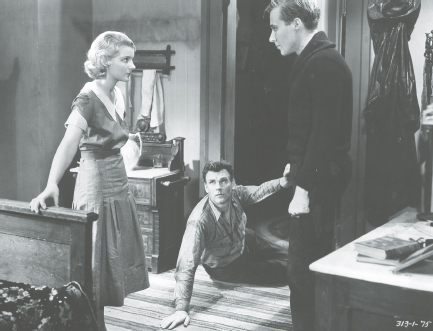
A reptilian fisherman (Walter Huston) comes between his mail-order bride (Helen Chandler) and his son (Kent Douglass), who wants to take her from him, in
A House Divided
(1931).
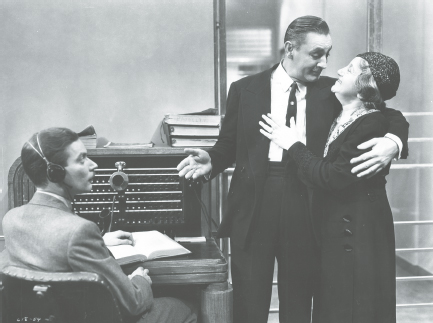
John Barrymore greets his “Yiddishe mama” (Clara Langsner) in
Counsellor-at-Law
(1933).
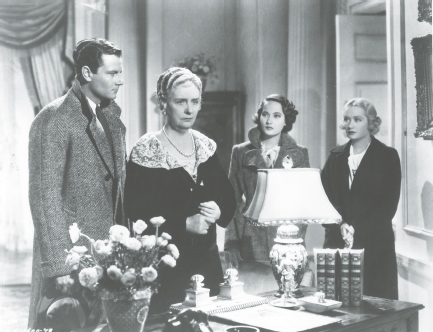
The young members of a love triangle (Joel McCrea, Merle Oberon, Miriam Hopkins) gather around the patron who ruins them (Alma Kruger) in
These Three
(1936).
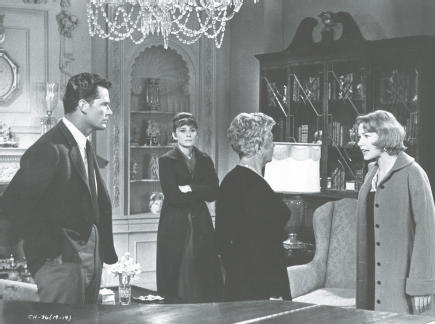
A similar triangular configuration in Wyler's remake of
The Children's Hour
(1961) features James Garner, Audrey Hepburn, Shirley MacLaine, and Fay Bainter (back to the camera).
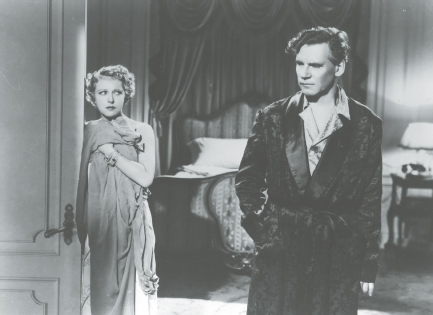
Sam Dodsworth (Walter Huston) and his wife, Fran (Ruth Chatterton), are American innocents whose marriage breaks apart on a European vacation in
Dodsworth
(1936).

Wyler maximizes space with his use of depth-of-field shots on the set for
Dead End
(1937).
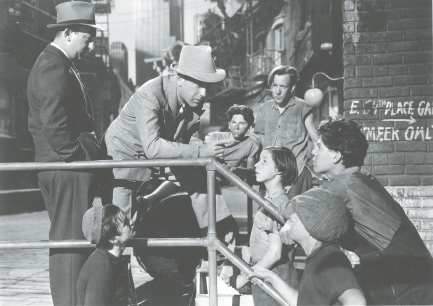
A group shot from
Dead End
puts the characters on different planes, featuring “Baby Face” Martin (Humphrey Bogart) and the Dead End Kids.
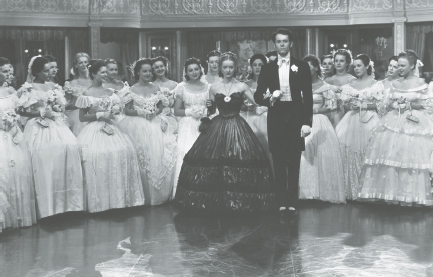
Julie Marsden (Bette Davis), escorted by her fiancé, Preston Dillard (Henry Fonda), scandalizes southern society in her red dress in
Jezebel
(1938).
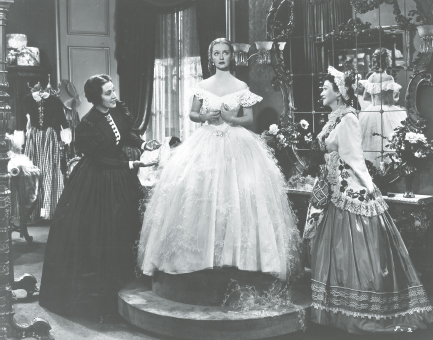
Julie tries on a conventional white dress before rejecting it; Wyler traps her within the mirror's frame.
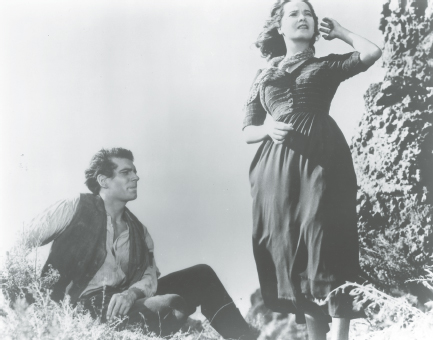
Heathcliff (Laurence Olivier) and Cathy (Merle Oberon) enjoy freedom in their natural habitat in
Wuthering Heights
(1939).
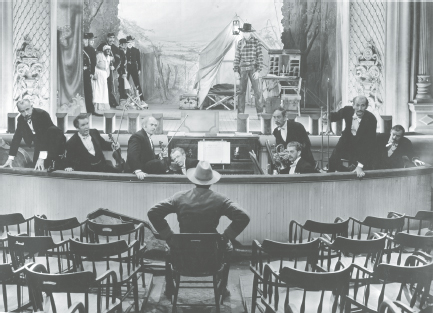
Judge Roy Bean (Walter Brennan), the sole patron at Lillie Langtry's concert, is surprised by his executioner and friend Cole Hardin (Gary Cooper) in a tightly framed “unwestern” space in
The Westerner
(1940).
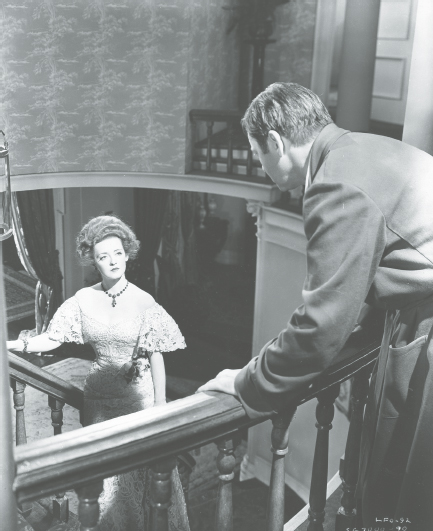
Horace Giddens (Herbert Marshall) thinks he has the upper hand in a confrontation with his wife, Regina (Bette Davis), in one of the many staircase scenes in
The Little Foxes
(1941).
